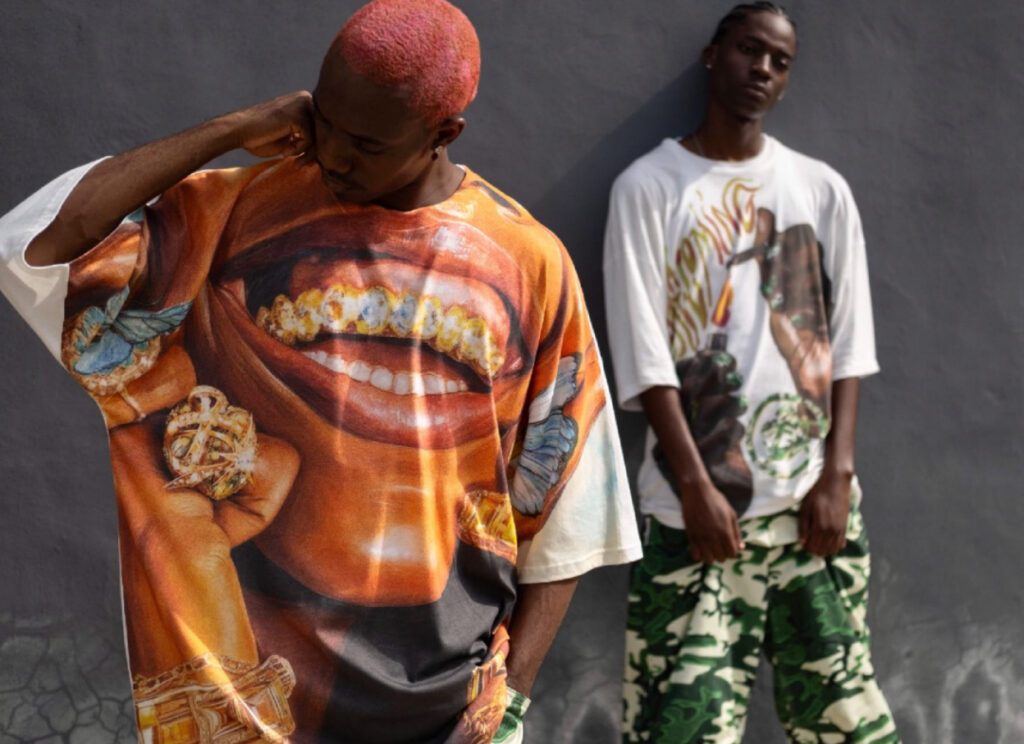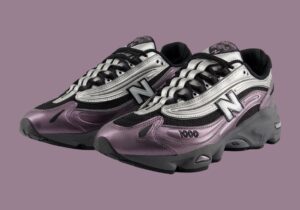For years, HOMECOMING has been more than just a festival—it has been a movement, a reunion, and a celebration of identity. Born in Lagos, HOMECOMING fuses music, fashion, sport, and culture into an electrifying multi-day experience that reclaims space, narrative, and aesthetic for Africa and its diaspora. Now, that spirit has found a permanent digital residence. With the launch of its first-ever e-commerce platform, HOMECOMING is no longer bound by time or geography. It is always open, always accessible—and unapologetically global.
The platform debuts with a curated collection of exclusive pieces, bringing together streetwear icons like Cactus Plant Flea Market, Patta, Denim Tears, and AMBUSH with independent African labels such as Free The Youth, WAF, Meji Meji, and Lagos-based newcomer PDF Channel. What was once only attainable through the dusty, sun-soaked streets of Lagos during HOMECOMING’s festival week is now a global dispatch of cultural firepower—shipped direct, coded in memory, sewn with meaning.
This isn’t just commerce. It’s a digital reimagination of cultural exchange.
HOMECOMING: From Cultural Festival to Cultural Framework
HOMECOMING began in 2018 as a Lagos-based festival centered around reconnecting the African diaspora with its roots through creativity. Spearheaded by Grace Ladoja, the festival quickly distinguished itself with a unique curatorial approach. It didn’t just invite performers—it created a transatlantic circuit of ideas. Artists like Skepta, Wizkid, and NSG shared the stage while brands like Off-White™, Daily Paper, and Patta collaborated with local designers on pop-up collections. In the years since, HOMECOMING has become a must-attend date on the cultural calendar—a convergence point for music, fashion, and Black identity.
The decision to launch an e-commerce platform was a logical next step. In a world that increasingly orients around digital accessibility, HOMECOMING’s online store ensures that its cultural impact isn’t limited to a few days in Lagos. It extends the life of its collaborations, offers continuity to its audience, and centralizes the movement it helped ignite.
But what makes this store different from a typical multi-brand streetwear site? The answer lies in its intentionality. Every drop is the product of conversation, context, and care.
The Debut Lineup: Streetwear’s Heavyweights Meet Africa’s Vanguard
The launch collection is a deliberate collision of established and emerging. On one side, you have globally revered names: Cactus Plant Flea Market, whose elusive graphic play has become a cult standard; Patta, whose DNA is interwoven with Amsterdam’s diasporic narrative and whose collaboration with Nigerian brand WAF speaks volumes; Denim Tears, Tremaine Emory’s deeply intellectualized brand that positions cotton as both material and metaphor; AMBUSH, a Tokyo-based brand equally invested in sculpture, subversion, and subculture.
On the other, you find a new guard—brands that have risen from Accra, Lagos, Nairobi, and Johannesburg with little more than grit, vision, and local resonance. Free The Youth, founded in Ghana, doesn’t just sell clothes—it documents street life, political consciousness, and youth identity in West Africa. Meji Meji brings an experimental Lagos edge, while WAF (WafflesnCream), Nigeria’s first skate brand, has long served as a cultural anchor for streetwear in the region.
Together, this lineup forms a mosaic. It’s not a hierarchy. It’s not mentorship. It’s a shared pulse. A shared homecoming.
E-Commerce as Archive and Anticipation
The new HOMECOMING site does more than just list prices and stock. It functions as a living archive—a digital museum of past moments, limited-edition capsules, and collaborative projects. Archival tees from previous festivals sit alongside new releases, each item tagged with its year and context. A Patta x WAF shirt might come with a blurb about the 2022 Lagos takeover; a Denim Tears tee may reference the Cotton narrative built into the 2023 collection. These aren’t just clothes. They’re cultural timestamps.
At the same time, the site teases the future. A “Coming Soon” section hints at upcoming regional collaborations, capsule series, and festival merch drops. There’s rumor of a Free The Youth pop-up capsule themed around “New Accra,” and an unreleased CPFM hoodie with a Lagos traffic grid heatmap. The site encourages sign-ups, not just for early access, but to join a rhythm—of releases, of return, of realignment.
Style As Sovereignty: Why This Matters
HOMECOMING’s e-commerce initiative isn’t merely a merchandising expansion—it’s an act of sovereignty. In a fashion world still dominated by Euro-American narratives, platforms like this serve as counterweight. They de-center the West, foreground the Global South, and prove that streetwear isn’t just about design. It’s about geography, politics, and cultural authorship.
There’s also the matter of agency. Too often, African creativity is exported through extractive models—scooped up, sanitized, and sold back to global audiences via middlemen. HOMECOMING’s store disrupts that model. It gives designers on the continent direct access to a worldwide audience. It builds infrastructure. It honors the local without diluting the global.
In this way, the store isn’t just an endpoint. It’s a circulatory system. A digital marketplace that flows both ways: exporting identity, importing visibility.
Logistics and The Global Supply Chain of Culture
Launching a digital storefront also means entering the labyrinth of logistics: customs, sizing charts, shipping delays, currency conversions. HOMECOMING, however, appears well-positioned. The site is built on an adaptive platform optimized for global traffic, with fulfillment partners across Lagos, London, and Los Angeles. It accepts multiple currencies, offers express worldwide shipping, and even includes an FAQ section about navigating import duties.
But it’s not just the technical execution that impresses—it’s the cultural logistics. Each product description includes not only sizing and care instructions, but also a narrative. Why this collaboration matters. What the designer was thinking. What city or story inspired it. It treats the customer not as a buyer, but as a witness.
Community Commerce: Beyond the Cart
One of the most radical ideas HOMECOMING brings to fashion e-commerce is its integration of community-first thinking. The platform includes a blog, HOMECOMING Journal, which features essays, interviews, and profiles of artists, designers, DJs, and dancers who orbit the festival. A sidebar on the homepage showcases recent community events in Lagos: a book launch in Surulere, a film screening in Lekki, a skating competition in Ojuelegba. It’s not just retail—it’s relational.
Even the product page for a WAF x Stüssy tee links to an article about the Lagos skate scene, tracing how that community formed and how HOMECOMING nurtured it. This isn’t post-purchase storytelling—it’s pre-purchase enrichment.
And that may be the platform’s most valuable contribution. It doesn’t just sell fashion. It frames it. It contextualizes it. It elevates it from object to archive, from garment to geography.
The Diaspora, Digitized
It’s difficult to overstate how significant HOMECOMING’s move into e-commerce is—not just for the brands it carries, but for the wider diaspora. In a moment when physical movement remains a luxury for many, and digital proximity is our closest mode of gathering, this platform becomes a kind of soft infrastructure. A cultural airport terminal. A place where someone in Johannesburg can buy a Lagos tee inspired by a Bronx beat.
The internet is full of stores. HOMECOMING’s is full of return.
It’s also deeply African in its sensibility—not just aesthetically, but structurally. The idea of circularity, of gathering, of building through kinship and rhythm, is written into every drop. The digital realm may not have soil, but HOMECOMING has planted roots here all the same.
Toward A Permanent Festival
What began as an ephemeral event has become a durable institution. By launching this site, HOMECOMING completes a cycle—it returns the love it has received, not just in product, but in presence. Now, whether the next physical festival is six months or six years away, the rhythm continues. The drops continue. The stories continue.
This e-commerce store isn’t a side project. It is the project. The digital arm of a cultural hydra that reaches across time zones, borders, and browser windows.
The clothes matter, yes. But the context? That’s the real flex.
No comments yet.








